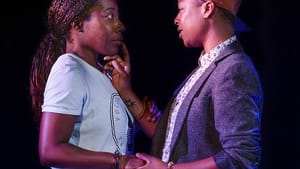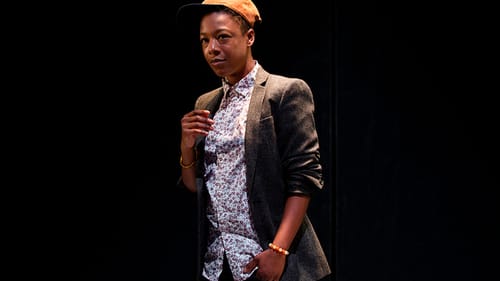Stay in the Loop
BSR publishes on a weekly schedule, with an email newsletter every Wednesday and Thursday morning. There’s no paywall, and subscribing is always free.
New country, old ways
Williamstown Theatre Festival presents ‘Dangerous House’

For more than a decade, I’ve spent part of every August at the Williamstown Theatre Festival (WTF) in Berkshire County, Massachusetts. Rarely does my summer getaway intersect with my day-to-day life as a Philadelphia theater critic, but on my most recent trip, I caught Jen Silverman’s powerful Dangerous House, a play with strong Philly connections.
Dangerous House premiered at InterAct Theatre Company in January 2015, under the title The Dangerous House of Pretty Mbane (here’s the BSR review). That production announced Silverman as a playwright to watch, unafraid to wrestle forthrightly with fraught topics. Here, she takes on the seemingly permissive culture of contemporary South Africa, a country whose outwardly liberal politics obscure an underbelly of intolerance and violence.
One minute is all it takes
South Africa became the first nation on the continent to legalize same-sex marriage in 2006 — four years before it hosted the FIFA World Cup, arguably the world’s most cosmopolitan sporting event. But even under the guise of legal protections, rank-and-file queers face an almost constant threat of persecution for choosing to live openly. “In the new South Africa, just as in the old, one minute is all it takes to change your life,” observes Noxolo (Alfie Fuller), a lesbian footballer who escaped to London in search of a freer life.
In her self-imposed exile, Noxolo’s thoughts turn to Pretty Mbane (Samira Wiley), the lover she left behind. Pretty’s masculine appearance and outspoken attitude mark her as a target for paternalistic men who view gender and sexual differences as unforgivable transgressions. She puts herself in worse danger when she turns her small apartment into a safe house for women who have suffered “corrective” rape, the barbaric practice of forced intercourse to “cure” lesbian women of their desires.
Returning to this ‘House’
Silverman has edited and revised the play since it first appeared on stage in Philadelphia; under Saheem Ali’s direction, the pacing is tighter, and the storytelling flows more organically as Noxolo moves between London, Cape Town, and the liminal space from which Pretty narrates the action. Dane Laffrey’s unit set, alternately lit with subtlety and abrasiveness by Lap Chi Chu, gracefully melds the disparate settings together, allowing the characters to move fluidly between worlds.
Humor allows Silverman to disarm the audience in order to deliver gut punches of grim reality. Minor characters Marcel (Phillip James Brannon), a gay expatriate who owns the London bar where Noxolo works, and Sicelo (Atandwa Kani), Noxolo’s protective older brother, function primarily as comic relief — until the harrowing moments when each reveals painful chapters of their pasts that have shaped their worldview. And Pretty, played with delightful swagger by Wiley, comes across as charming and mercurial, traits that both embolden and endanger her as she does her important work.

Who should tell the story?
Yet certain problems persist — not least of which is whether Silverman, a white American, is the right person to tell this story. She indirectly acknowledges this in an interview printed in the WTF program, and the presence of Gregory (Michael Braun), an American journalist chasing a unique World Cup story to rebuild his reputation, can be read as an authorial stand-in.
But the play itself functions from Noxolo’s perspective, and although Fuller gives a wonderfully committed performance, her motivations sometimes remain unexplained. The decisions to leave South Africa, then to immediately return, happen in snaps, and could benefit from further exploration. The contrast between Noxolo’s outward pragmatism and Pretty’s brash, headstrong sense of righteousness should also be clearer.
Silverman also tends to sanctify Pretty, which does a disservice to the brave, complicated woman we are meant to see. Pretty is an extraordinary, ordinary woman; her heroism comes from her humanness, not because she’s lit from within.
Gregory, too, has a whiff of the white savior about him. Although he maintains that South Africans have the most powerful voice in telling their own stories, he’s the one with the pen, and he will shape the Western narrative of the country by what he writes.
Living out loud
But Gregory’s presence also speaks to how little the country has changed since the end of Apartheid. His authority comes from his whiteness and his Western passport, commodities that remain desirable to the country’s most powerful people. Braun’s wily performance acknowledges this, as he strikes deals with Sicelo and tells white lies to the local police on behalf of Noxolo.
A contemporary South African playwright would surely approach the play’s complicated issues with more nuance and understanding — in much the same way that African-American playwrights of the ‘50s and ‘60s would offer a more authentic perspective on race in America than Carson McCullers, whose The Member of the Wedding performs next door to Dangerous House on the WTF main stage.
But Silverman still has much to say, and she largely handles her subject with restraint and respect. And through Noxolo, who finds her voice through her desire to live out loud, she offers hope for the future of South Africa.
What, When, Where
Dangerous House. By Jen Silverman, Saheem Ali directed. Through August 19, 2018, at Williamstown Theatre Festival, 1000 Main Street, Williamstown, Massachusetts. (413) 458-3253 or wtfestival.org.
Sign up for our newsletter
All of the week's new articles, all in one place. Sign up for the free weekly BSR newsletters, and don't miss a conversation.
 Cameron Kelsall
Cameron Kelsall